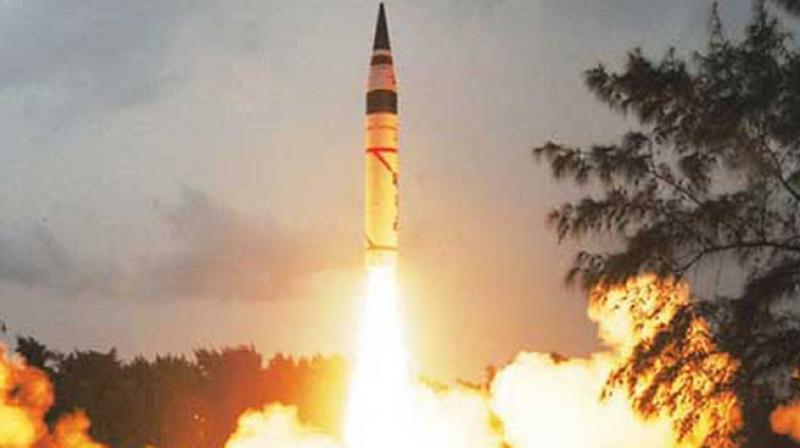Pak objects to India's missile programme, calls it danger to peace: report

Islamabad: Pakistan on Thursday cautioned members of MTCR that introduction of "destabilising systems" like "missile defence programmes" and "inter-continental ballistic missiles" in South Asia pose a "risk" to regional stability, in an apparent reference to India.
Pakistan's "serious concerns" over the introduction of such systems in South Asia were expressed to a delegation of Missile Technology Control Regime (MTCR), a 35-member elite grouping that includes India and controls export in high-end missile technologies, a Foreign Office (FO) statement said.
"Pakistan highlighted the risks posed to regional peace and stability due to the introduction of destabilising systems such as missile defence programmes and inter-continental ballistic missiles," the FO statement said.
India is the only country in South Asia having successfully tested inter-continental ballistic missiles.
"Pakistan was, however, committed to avoiding any kind of arms race in South Asia," it said, adding that Pakistan's proposal on establishing Strategic Restraint Regime (SRR) in South Asia which covers nuclear and missile restraint remains on the table.
"Pakistan believes that progress on this proposal (SRR) through meaningful dialogue can promote peace and stability in the region," it said.
Highlighting Pakistan's non-proliferation credentials, Additional Secretary, FO, Tasneem Aslam told the MTCR that Pakistan has always remained in the "forefront to stop the spread of weapons of mass destruction" and has "always followed international standards while delivering weapons".
Aslam also briefed the delegation led by by Ham Sang-Wook, the current MTCR Chair, about the administrative, legislative and regulatory measures taken by Islamabad for the establishment of a robust command and control system, an effective and comprehensive export control regime, and the steps taken to improve physical security at all levels.
"Pakistan's export control regime is at par with the best international standards and its national control lists encompass the items and technologies controlled by the MTCR,"
Aslam said.
A country's non-proliferation record is one of the key criteria to join MTCR.
Pakistan has intensified its efforts to join the exclusive club of countries, controlling exports in missile technology, since India joined the elite grouping last year as its 35th member.
Notably, India was successful in joining MTCR, ahead of Pakistan's all-weather ally China, whose application is pending since 2004.
However, experts say that Pakistan's controversial record in nuclear proliferation and absence of its patron China inside the club are major obstacles in Islamabad becoming a formal member of MTCR.
Aslam further said that hindrances in access to advanced technology for peaceful purposes "must come to an end".
Representatives of the MTCR delegation said that the group wants a joint policy to prevent the spread of missiles.
The delegation recognised that Pakistan has participated in several technical meetings held by the MTCR for the past several years, the statement said.
Meanwhile, the Foreign office also released a reviewed list of nuclear and biological weapons. The new list declares that Pakistan is determined towards nuclear non-proliferation.
The reviewed list was formed after consultation with relative ministries, it said. The list has been reviewed in the years 2005, 2011 and 2015.

